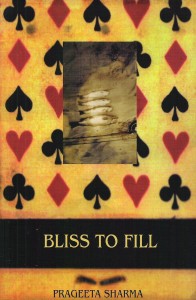
ISBN-13: 978-1930068001
Published 2000
Available at Amazon.com and SPDBooks.org
The use of poetry in this day and age is for its lesson of relation. Bliss to Fill is full of love poems, full of I and you and all their difficulties in getting along. And here, in the midst of love’s intimacies, the poem is large and necessary, negotiating places and cultures, negotiating what it means to be relating across boundaries. This is a stunning collection.
—Juliana Spahr
While others were writing software Prageeta Sharma was writing “Dear ____ or Bliss to Fill”, a rhapsodic collection in which the poet uncannily braids the young and anticipatory with the elderly and elegantly alone. Her medium: loyalty; her climate: tender. She pleasures us by her agile shifts in mood and her lithe twists of tongue. This is a delicately fierce book.
—C. D. Wright
From Publishers Weekly
“I soak underwear with my head out to dry,// I am happy to be organized with my problems,/ keeping them simple and deft for an unremarkable bathtub oratory.” An ebullient, South Asian-American identity is put through the emotional wringers of lost love, first generationality, and New York City in this debut-and emerges triumphant. The book takes its title and one of two epigraphs from Dickinson (“Our blank is bliss to fill”), and is suffused with a Dickinson-like archaic diction that lends “Prageeta,” as she appears in the third person, an historical aureole: “Arguments/ do arouse this poem which oscillates in the same, trying space as arguments./ How do we rise to a spiritual position? Prageeta asks. Wanting to again, reading/ Hegel, she asks the book to fly to him.” The book is divided into two chapbook-length sections. The first, “Dear _____,” includes letters to a lover-like “Dearest echo,” and to disheartened comsumers of Prageeta’s poems; contemplates the arranged marriage of the poet’s parents; and exhorts a “Politician Bird” “Do continue to free the clouds from the firm, plastic, earth.” The second, “The Other Possibility,” considers lifestyles like those of the multi-part “All-Purpose Rockstar” (where a poet taunts fans, and deploys “The song designed for situational/ dumbness”); of a bitter, bizarre “Girl Vendor” (“my spacecraft is more project-/ oriented than your spacecraft”); of “The Assassins”; and even a “Suburban Address.” At once playful, ironic and affecting, this debut suggests that Sharma will “roll onward, to deviate, to leeward-I did have thrills/ or happily ate, or vigor caught me.” (Feb.)
Copyright 2000 Cahners Business Information, Inc.
About the Author
The first-generation child of a South Asian immigrant family and a native of Framingham, Massachusetts, Prageeta Sharma is the author of Bliss to Fill (Subpress, 2000), The Opening Question (Fence Books, 2004; selected by Peter Gizzi for the 2004 Fence Modern Poets Prize), Infamous Landscapes (Fence Books, 2007), and Undergloom (Fence Books, 2013). She is also the recipient of the 2010 Howard Foundation Grant. Sharma is associate professor and director of the creative writing program at the University of Montana.
